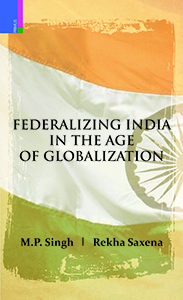
Federalizing India in the Age of Globalization
AUTHOR – M.P. Singh and Rekha Saxena
| HB ₹850 . $59.95 . ₤39.95 |
||
INFORMATION
- AUTHOR : M.P. Singh and Rekha Saxena
- HB ISBN : 978-93-80607-59-7
- Year : 2013
- Extent : xii + 224
- Discount available on checkout
- Usually dispatched within 3 to 5 working days.
Federalizing India in the Age of Globalization
| HB ₹ 850 . $ . ₤ |
PB ₹ . $ . ₤ |
|
| POD ₹ . $ . ₤ |
e-Book ₹ . $ . ₤ |
INFORMATION
- AUTHOR – M.P. Singh and Rekha Saxena
- ISBN – 978-93-80607-59-7
- Year – 2013
- Extent: 400 + 40 coloured illustrations
- 10% discount + free shipping
- Usually dispatched within 3 to 5 working days.
The major new direction of change in the Indian political system today is the gradual political decentring of a predominantly parliamentary system of the first four decades after Independence into a new federalizing and globalizing India since the early 1990s.
The early stirrings of federalization were indeed evident in the territorial reorganization of the states along linguistic lines in response to popular movements in the 1950s and 1960s. Further territorial reorganization was subsequently agitated for and conceded on tribal lines in the north-east and on regional economic backwardness in Jharkhand, Uttarakhand, and Chhattisgarh. Another strand of federalization was evident in the grant of asymmetrical federalism in Jammu & Kashmir, Nagaland, and Mizoram. However, the most comprehensive wave of federalization that has gripped politics and governance in India has surfaced since the early 1990s. The indicators and impact of political federalization are evident in the new grammar of politics pervading the working of governmental institutions — the legislative, exclusive, and judicial branches of governments as well as the union, state, and local governments. The political factors that have led to the process of federalization in an accelerated momentum are the party system transformation with regional parties coming to play a decisive balancing role in Indian politics and globalization.
The Author
M.P. Singh is the Director of Research, Centre for Multilevel Federalism, Institute of Social Sciences, New Delhi, and the editor of the CMF Newsletter.
Rekha Saxena is Associate Professor, Department of Political Science, University of Delhi.
The major new direction of change in the Indian political system today is the gradual political decentring of a predominantly parliamentary system of the first four decades after Independence into a new federalizing and globalizing India since the early 1990s.
The early stirrings of federalization were indeed evident in the territorial reorganization of the states along linguistic lines in response to popular movements in the 1950s and 1960s. Further territorial reorganization was subsequently agitated for and conceded on tribal lines in the north-east and on regional economic backwardness in Jharkhand, Uttarakhand, and Chhattisgarh. Another strand of federalization was evident in the grant of asymmetrical federalism in Jammu & Kashmir, Nagaland, and Mizoram. However, the most comprehensive wave of federalization that has gripped politics and governance in India has surfaced since the early 1990s. The indicators and impact of political federalization are evident in the new grammar of politics pervading the working of governmental institutions — the legislative, exclusive, and judicial branches of governments as well as the union, state, and local governments. The political factors that have led to the process of federalization in an accelerated momentum are the party system transformation with regional parties coming to play a decisive balancing role in Indian politics and globalization.
The Author
M.P. Singh is the Director of Research, Centre for Multilevel Federalism, Institute of Social Sciences, New Delhi, and the editor of the CMF Newsletter.
Rekha Saxena is Associate Professor, Department of Political Science, University of Delhi.




